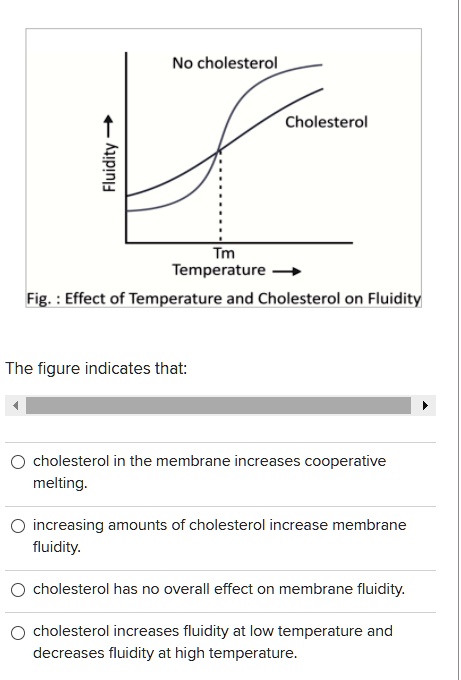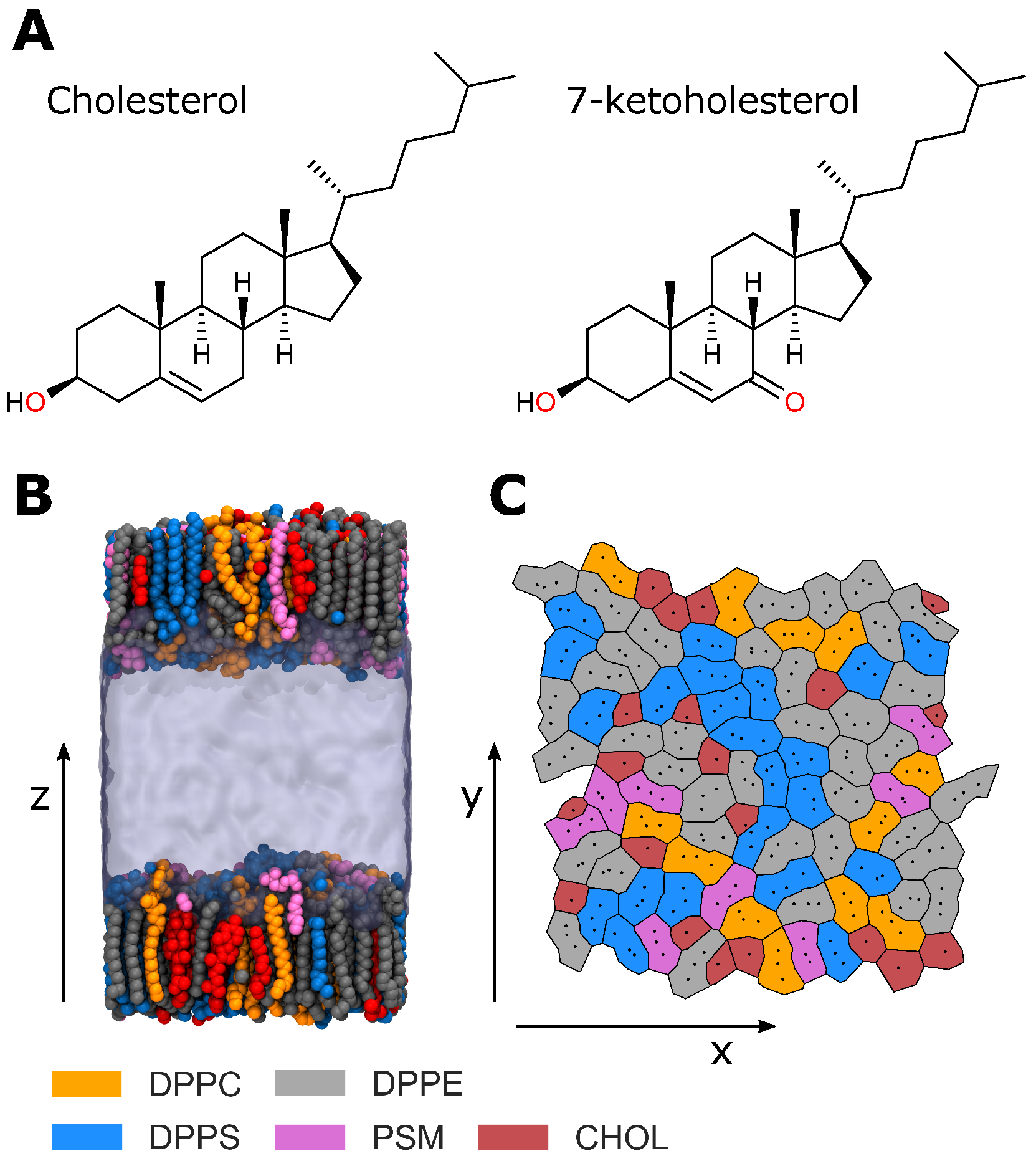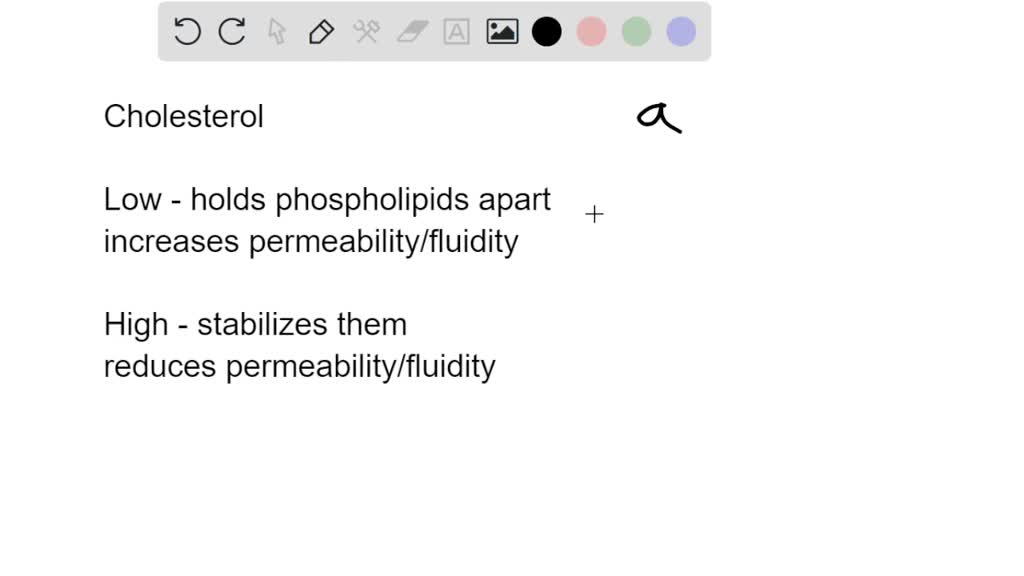Cholesterol decreases fluidity at high temperatures and increases fluidity at low temperatures Cholesterol increases fluidity at high temperatures and increases Huidity at low temperatures Cholesterol decreases fluidity at high tem ratures and decreases fluidity at low This problem has been solved!
Predicting the Effects of Internal Membranes & Membrane Bound Organelles that Facilitate Compartmentalization Practice | Biology Practice Problems | Study.com
Lipid composition determines membrane properties, and cholesterol plays a major role in this determination as it regulates membrane fluidity and permeability as well as induces the formation of coexisting phases and domains in the membrane.

Source Image: numerade.com
Download Image
The 4th edition of Alberts clearly says that cholesterol makes the membrane less fluid: “cholesterol tends to make lipid bilayers less fluid at the high concentrations found in most eucaryotic plasma membranes“. – user24284 Sep 12, 2017 at 9:50 Actually, cholesterol has different effects on the fluidity at different temperatures.

Source Image: mdpi.com
Download Image
SOLVED: Which of the following is TRUE regarding how cholesterol affects the fluidity and; permeability of biological membranes? At low temperatures, cholesterol causes phospholipids to pack more tightly together; and therefore; decreases
Which statement best describes how cholesterol affects cell membrane fluidity? a. Cholesterol increases fluidity at high temperatures and decreases fluidity at low temperatures. b. Cholesterol increases fluidity at high temperatures and increases fluidity at low temperatures.

Source Image: mdpi.com
Download Image
Which Statement Best Describes How Cholesterol Affects Cell Membrane Fluidity
Which statement best describes how cholesterol affects cell membrane fluidity? a. Cholesterol increases fluidity at high temperatures and decreases fluidity at low temperatures. b. Cholesterol increases fluidity at high temperatures and increases fluidity at low temperatures.
Cell membrane fluidity is the property of the cell membrane that allows it to adapt its shape and movement to different conditions. Three key factors influence cell membrane fluidity: temperature, cholesterol, and the kind of fatty acids in the phospholipids that form the cell membrane. These factors alter the space and interaction between the
Membranes | Free Full-Text | Red Blood Cell Membrane Cholesterol May Be a Key Regulator of Sickle Cell Disease Microvascular Complications
Expert Q&A Plagiarism checker Expert proofreading This question hasn’t been solved yet Not the exact question you’re looking for? Answer to Which statement best describes how cholesterol
Modulation of Membrane Fluidity Performed on Model Phospholipid Membrane and Live Cell Membrane: Revealing through Spatiotemporal Approaches of FLIM, FAIM, and TRFS | Analytical Chemistry

Source Image: pubs.acs.org
Download Image
MCAT – Biology of the Cell (Cell Membrane Overview) Flashcards | Quizlet
Expert Q&A Plagiarism checker Expert proofreading This question hasn’t been solved yet Not the exact question you’re looking for? Answer to Which statement best describes how cholesterol

Source Image: quizlet.com
Download Image
Predicting the Effects of Internal Membranes & Membrane Bound Organelles that Facilitate Compartmentalization Practice | Biology Practice Problems | Study.com
Cholesterol decreases fluidity at high temperatures and increases fluidity at low temperatures Cholesterol increases fluidity at high temperatures and increases Huidity at low temperatures Cholesterol decreases fluidity at high tem ratures and decreases fluidity at low This problem has been solved!

Source Image: study.com
Download Image
SOLVED: Which of the following is TRUE regarding how cholesterol affects the fluidity and; permeability of biological membranes? At low temperatures, cholesterol causes phospholipids to pack more tightly together; and therefore; decreases
The 4th edition of Alberts clearly says that cholesterol makes the membrane less fluid: “cholesterol tends to make lipid bilayers less fluid at the high concentrations found in most eucaryotic plasma membranes“. – user24284 Sep 12, 2017 at 9:50 Actually, cholesterol has different effects on the fluidity at different temperatures.

Source Image: numerade.com
Download Image
Rationalizing Steroid Interactions with Lipid Membranes: Conformations, Partitioning, and Kinetics | ACS Central Science
Which statement best describes how cholesterol affects cell membrane fluidity? Cholesterol decreases fluidity at high temperatures (due to increased Van der Waals forces) and increases fluidity at low temperatures (due to decreased Van der Waals forces).

Source Image: pubs.acs.org
Download Image
Laurdan Discerns Lipid Membrane Hydration and Cholesterol Content | The Journal of Physical Chemistry B
Which statement best describes how cholesterol affects cell membrane fluidity? a. Cholesterol increases fluidity at high temperatures and decreases fluidity at low temperatures. b. Cholesterol increases fluidity at high temperatures and increases fluidity at low temperatures.

Source Image: pubs.acs.org
Download Image
Determining Cholesterol Binding to Membrane Proteins by Cholesterol 13C Labeling in Yeast and Dynamic Nuclear Polarization NMR | Journal of the American Chemical Society
Cell membrane fluidity is the property of the cell membrane that allows it to adapt its shape and movement to different conditions. Three key factors influence cell membrane fluidity: temperature, cholesterol, and the kind of fatty acids in the phospholipids that form the cell membrane. These factors alter the space and interaction between the

Source Image: pubs.acs.org
Download Image
MCAT – Biology of the Cell (Cell Membrane Overview) Flashcards | Quizlet
Determining Cholesterol Binding to Membrane Proteins by Cholesterol 13C Labeling in Yeast and Dynamic Nuclear Polarization NMR | Journal of the American Chemical Society
Lipid composition determines membrane properties, and cholesterol plays a major role in this determination as it regulates membrane fluidity and permeability as well as induces the formation of coexisting phases and domains in the membrane.
SOLVED: Which of the following is TRUE regarding how cholesterol affects the fluidity and; permeability of biological membranes? At low temperatures, cholesterol causes phospholipids to pack more tightly together; and therefore; decreases Laurdan Discerns Lipid Membrane Hydration and Cholesterol Content | The Journal of Physical Chemistry B
Which statement best describes how cholesterol affects cell membrane fluidity? Cholesterol decreases fluidity at high temperatures (due to increased Van der Waals forces) and increases fluidity at low temperatures (due to decreased Van der Waals forces).









